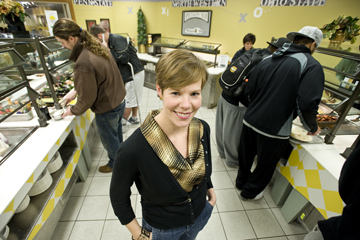Game Starters: Rachel Clark

Rachel Clark, sport dietitian for Purdue Athletics, attends meals with Purdue football players to consult on nutrition and food options. (Purdue photo/Andrew Hancock)
A familiar adage says, "You are what you eat," and Rachel Clark, sports dietitian for Purdue Athletics and continuing lecturer for the Department of Nutrition Science, takes it seriously when planning meals for Purdue's football team.
The pregame menus, which include barbecue chicken breast, whole-grain pancakes, low-fat milk and every color of fruits and vegetables, ensure players have the right balance of carbohydrates, proteins, hydration and vitamins to perform and recover.
Clark's experience as a member of Purdue's crew team from 1994 to 1998 helps her understand the challenges student-athletes face and better identify with the 500 student-athletes she educates and consults.
What do you do as a board certified sports dietitian within Purdue Athletics?
My job is to help our athletes improve their performance using food and nutrition. I am available to all varsity student-athletes for consultations, team meetings and dietary supplement evaluation. I also provide input on menu development at training table where dinner meals are provided to football, volleyball and men's and women's basketball players.
I select the right combination of healthy whole foods and monitor food safety to prevent illness. I educate athletes about the risks and proper use of dietary supplements, about the "feed to fuel" philosophy practiced by sports dietitians and about the nutrients necessary to make recovery from injury as speedy and complete as possible.
How do the two sides of your split appointment between the Department of Nutrition Science and Intercollegiate Athletics complement one another?
It's great being able to regularly practice my specialty in the field. This gives me a lot of good stories to illustrate points in class and raises my credibility with my students. As part of my position within Nutrition Science, it's necessary for me to keep up with the most recent developments in nutrition, which improves what I do in Athletics.
How do you educate student-athletes about proper nutrition?
I work closely with the football team to guide them in making proper nutrition choices. Last fall after the football season ended, I met with the various position groups for sports nutrition education and then we'd go to training table together to help them choose foods for dinner. We held these sessions repeatedly during winter. During the summer months, I continued to meet with the players as a group to introduce new sports nutrition concepts or reinforce old ones. Sometimes I hold cooking demonstrations and do individual consultations involving anything related to food or eating from meal planning and grocery shopping to fighting the fatigue that comes with intense training.
How are you involved in football game day preparations?
I set the standards for food and fluid intake prior to, during, at halftime of and after each game. I help plan for special game situations like cold weather or high heat and humidity. I develop, monitor and update pregame meals and snacks on Friday nights and Saturdays. On Friday nights, I'm present at the team's dinner meal and at their pregame breakfast meal. This allows me to make sure the team has access to the right combination of healthy, whole foods and to tweak options as the season progresses.
Have you made any changes to the football team's nutrition since you began working with the players?
Prior to my involvement with pregame meals, fried chicken was a staple on Friday nights, but that's not the case anymore. Every Friday night, at least one of them asks me, "Are we having fried chicken?" They do miss it, but they also realize the value of healthy pregame fueling.
Why is it important, especially for athletes, to pay such close attention to their nutrition?
Eating the right food at the right times keeps athletes well, so they can continue training, stay active in the weight room and compete every Saturday. A shortfall in an athlete's performance may stem from a shortfall in his eating habits. For example, too few calories or too little colorful produce can lead to more illness since the immune system is negatively affected by those deficits. Or if an athlete is running out of steam in the fourth quarter, he may not have enough fluid or he might not have refueled properly at halftime. Strategic use of food enhances performance and gives an athlete an edge over his competition.
What steps do you take to ensure that ill or injured athletes recover well?
If an athlete does get sick or hurt, proper nutrition can speed rehabilitation and recovery processes and improve the extent to which an athlete is able to recover. The recovery process takes place daily, though. Refueling and rehydrating after practices, training sessions and games are part of recovering. Post-exercise carbohydrates replace the fuel the athlete used and prepares their bodies for the next session. Post-exercise protein allows for maximum muscle repair and building.
Have there been any memorable moments from your time working with the football team?
When I worked with the team last fall through this summer, we did periodic checks of lean muscle mass and body fat percentage. I was impressed with the considerable improvements most of the guys on the team made. On average, the team gained 11 pounds of lean muscle mass and lost 10 pounds of fat mass. Some guys improved by twice that. It's satisfying to know that the nutrition changes they made contributed to their success.
